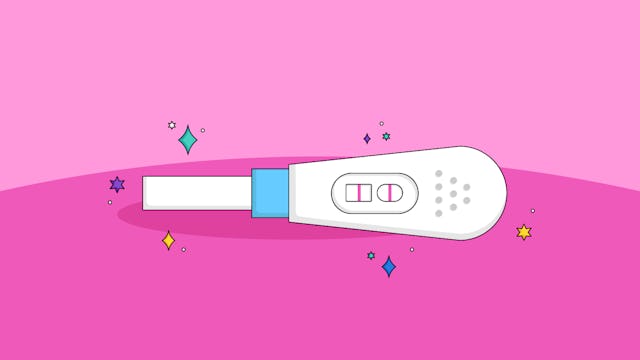4 Weeks Pregnant — How To Calculate Your Due Date

Welcome to Scary Mommy’s pregnancy week by week guide! We’re here to give you all the info about what to expect when you’re expecting: be it week by week symptoms, your baby’s development, your changing body, or ultrasounds and appointments. Here’s everything you need to know about week 4.
Your Body at 4 Weeks Pregnant
Implantation and HCG Production
While some women may not even know they’re pregnant at this point, the body is a busy hub of activity. This week, your sweet little blastocyst will find its way to the uterus where it will implant into the endometrium of the uterine wall, its home for the next 38 weeks or so. The tiny membrane will now divide into two, with one half forming the placenta and the other forming the embryo.
Some women may experience early pregnancy symptoms this week, like tender and sensitive breasts, nausea, cramping, back pain, and headaches. Others might have no symptoms at all save for a missed period. This week is also when the newly formed placenta begins to produce the pregnancy hormone human chorionic gonadotropin (hCG), which will confirm a pregnancy via a urine or blood test.
Calculate Your Due Date
Even if you’ve tested positive for an at-home pregnancy test, your first visit with your OB might not be for another month, around week 8. But you don’t have to wait that long to figure out your due date. All you need to know is the first day of your last menstrual cycle and some simple math.
Since the average pregnancy lasts for 40 weeks — 38 weeks pregnant, plus two weeks before you conceived — you can make the simple calculation by adding 40 weeks to the first day of your last period.
Your Baby at 4 Weeks Pregnant
The Embryo is Developing Fast
Believe it or not, week 4 is a crucial stage of development for your little one. This is the week when the embryo forms three distinct layers: the ectoderm, mesoderm, and the endoderm. The ectoderm will go on to form the nervous system, the brain, skin, hair, nails, sweat glands, and the mammary glands. The mesoderm will form the heart, blood system, skeleton, and muscles. And the endoderm develops into the lungs, liver, gastrointestinal system, thyroid, and pancreas.
The fetus is now 0.078 inches in length and though indistinguishable this early on, the embryo also forms itty, bitty buds that will go on to be your baby’s arms and legs.
In short, things are cooking and you might not even know you’re pregnant yet.
Your Symptoms and Health at 4 Weeks Pregnant
Early Pregnancy Symptoms to Watch Out For
Missed Period
For women with regular menstrual cycles, a missed period is the first sign that they may be pregnant. With the newly formed placenta producing hCG, a woman using an at-home pregnancy test would test positive at this point.
Implantation Bleeding
Typically occurring 10 to 14 days after ovulation, some women experience implantation bleeding when the blastocyst attaches itself to the uterine wall a few days before a missed period. The spotting will be very faint and unlike the bleeding you experience during your menstrual cycle.
Tender or Swollen Breasts
A surge in pregnancy hormones can make your breasts feel extra sensitive, tender, and sore to the touch. They may also feel fuller than they did before. Don’t worry, the discomfort should subside in a few weeks.
Bloating & Constipation
A surge in pregnancy hormones can cause your digestive system to slow down, leaving you feeling bloated and constipated. Not to worry, this is a common early pregnancy symptom.
Cramping
Many women feel light cramping in the first weeks of their pregnancy, typically low in their abdomen, as the small mass of cells that will form your baby burrows into the uterus.
Prenatal Vitamins are Key
Doctors recommend a woman start taking prenatal vitamins at least three months before she conceives. The folic acid in the vitamins will reduce the risk of spina bifida, a congenital spine defect. If you haven’t started taking your prenatal vitamins yet, this is a perfect time to start. The folic acid, vitamin B, C and D, calcium, thiamine, riboflavin found in prenatal vitamins is essential for you and the baby now.
Double Trouble
By week four, twins will be two separate embryos with (in most cases) separate placentas to get all the nourishment they need from Mom. They’re growing at the same rate as singular pregnancies, they just don’t have the uterus all to themselves!
If you’re having twins, you’re going to experience all the symptoms above – but more intensely. Your body is producing more hCG than that of a woman carrying one baby. While pregnancy tests can detect this hormone, they can’t detect the volume present, so you probably won’t know you’re carrying twins for another few weeks.
The contents of this article have been medically reviewed by Ruth A. Tessler, M.D. in July, 2019.
Written by Maia Efrem.
Read More:
1-3 Weeks Pregnant — Not Quite Pregnant…Yet
5 Weeks Pregnant — Your Baby Is The Size Of A Pop Rock
This article was originally published on